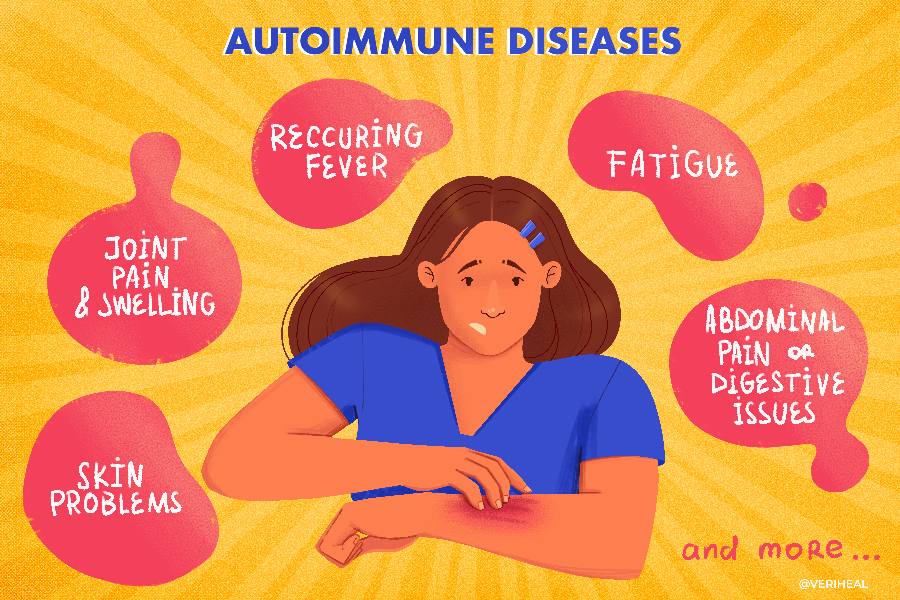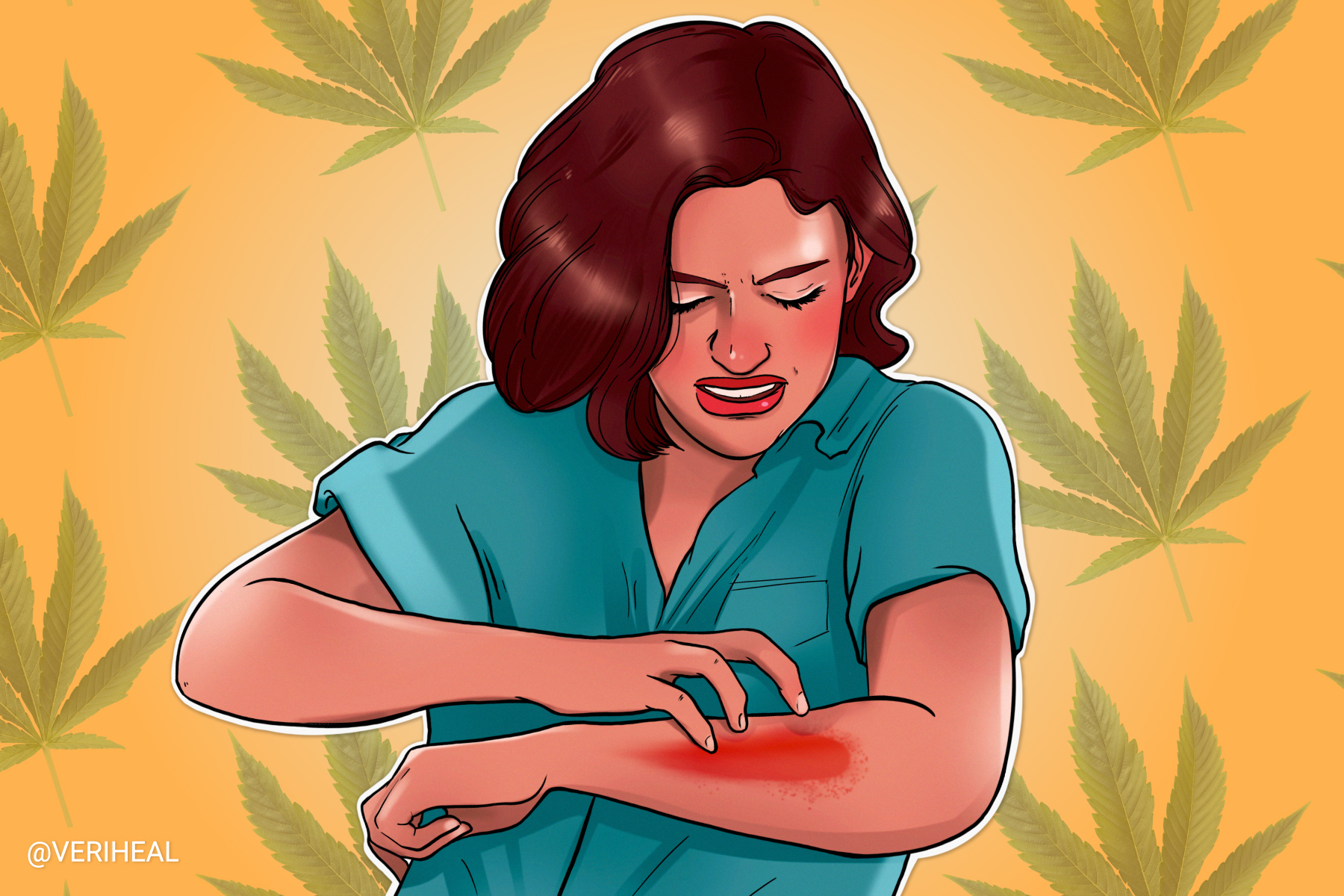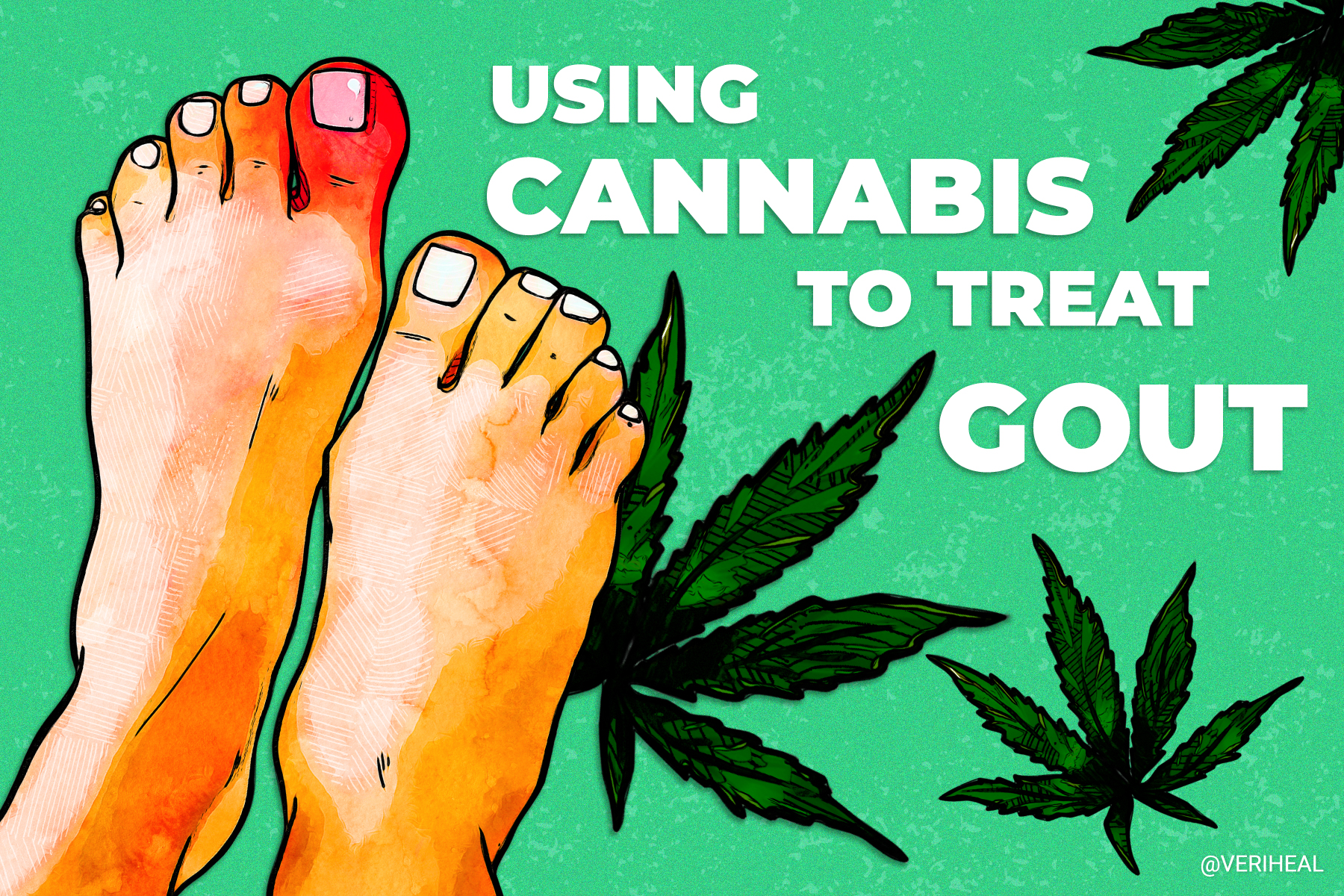The Role of Cannabis in Healing Autoimmune Disease

- Immunosuppression
- Digestive Inflammation
- Different Treatment Recommendations for Autoimmune Diseases
- Considerations to Keep in Mind
- Understanding Autoimmune Condition Classifications
- Autoimmune vs. Autoinflammatory Diseases
Even though autoimmune diseases typically have no cure, the symptoms of fatigue, joint pain, chronic pain, and insomnia can be treated in various ways to help the patient live a more comfortable life. Cannabis Sativa and its cannabinoids, including Δ9-tetrahydrocannabinol (THC) and cannabidiol (CBD), begin activation with their introduction into the endocannabinoid system.
The endocannabinoid system consists of fat-based neurotransmitters that are made in the body. Two of the most well-studied endocannabinoids are anandamide (AEA) and 2-arachidonoylglycerol (2-AG). When cannabinoids enter the body, they make contact with CB1 and CB2 receptors throughout the body. This can directly increase or decrease endocannabinoids in the body, working as a chain reaction and influencing the way the body modulates pain, inflammation, homeostasis, and other processes.
Interestingly, when the endocannabinoid system is not regulated by the body properly, it can cause a variety of chronic conditions including cancer and Alzheimer’s disease (1). For more information on how the endocannabinoid system works, please see our page on endocannabinoids here.
Immunosuppression
THC and CBD, along with other cannabinoids found in medical marijuana, can trigger immunosuppressive effects. This works because they trigger apoptosis, or cell death, in immune cells called t-lymphocytes and macrophages (16). T-lymphocytes and macrophages are responsible for attacking foreign pathogens in the body, but when an autoimmune disease occurs, these cells attack healthy tissues and cause inflammation. Triggering cell death means a decrease in these cells attacking healthy tissue.
THC also attacks inflammation through cytokines which are immune signaling proteins. When cytokines are disrupted, white blood cell production slows, which slows the body’s immune response, and inflammation is decreased (16).
A 2021 clinical trial review published in Cannabis and Cannabinoid Research evaluated the results of 24 studies focusing on autoimmune disease and immunosuppression. They found that CBD is one of the main activators of immune function from using cannabis (19). CBD was responsible for decreasing the number of TH1 and TH17 proinflammatory cells as well as decreasing proinflammatory white blood cells including cytokines, interleukin, and interferon.
Researchers also believe that terpenes, naturally occurring chemicals found in plants that are responsible for scents, work together to exert anti-inflammatory and antinociceptive (blocking the perception of pain) activities (7). They have also found that using CBD, cannabigerol (CBG), and other combinations of cannabinoids and terpenes tends to help relieve inflammatory responses in the body better than just utilizing THC on its own (9). Using cannabinoids in combination together as mentioned above for an increase in health benefits is known as the entourage effect.
As you can see, medical cannabis helps relieve inflammation through several different immune symptom responses, and the pathway for how it works may vary based on the type and location of where the inflammation is present.
Digestive Inflammation
Digestive inflammation, such as what is found in ulcerative colitis and Crohn’s disease, can be directly influenced by cannabis use and endocannabinoids. Neutrophils, one of the main types of white blood cells found in the body, are responsible for intestinal inflammation in autoimmune issues that affect the digestive tract. The transporter P-glycoprotein (P-gp) is responsible for decreasing the inflammatory responses of neutrophils and is modulated by the CB2 receptors of the endocannabinoid system (1).
Different Treatment Recommendations for Autoimmune Diseases
How you treat your autoimmune disorder with cannabis or CBD only will vary based on the type you have and where the body is attacking itself. Please check out the following conditions to give you more insight into treating the specific symptoms of the following:
- Psoriasis
- Arthritis
- Rheumatoid arthritis
- Multiple sclerosis
- Inflammation
- Chronic pain
- Insomnia
- Ulcerative colitis
- Crohn’s disease
- Amyotrophic lateral sclerosis (ALS)
- Diabetes
- Fibromyalgia
- Neuropathy
- Lupus
Considerations to Keep in Mind
It is important to talk with the doctor who is treating your autoimmune condition before beginning treatment with medical marijuana as drug interactions and side effects may occur. In addition, these conditions may need to be treated differently depending on the type you have and where it occurs in the body. It is important to treat these diseases early because they may progress to permanent damage if left unchecked or incompletely treated. It is also recommended to begin with low doses of medical marijuana and gradually increase them from there.
Cannabis has been known to cause potentially negative side effects including a potential increase in anxiety, change in heart rate, and appetite stimulation (20). Sometimes the side effects from cannabis may help your specific condition. The long-term effects are yet to be fully known.
Understanding Autoimmune Condition Classifications
Autoimmune conditions are diseases where the body attacks itself, creating pain, inflammation, and other symptoms. They can be categorized into two classes. Organ-specific autoimmune diseases occur when the negative immune response is isolated in a single organ (2). Systemic autoimmune diseases occur when the immune system attacks antigens in several organs in the body. Below are some examples of both classes (13).
Examples of systemic autoimmune diseases:
- Systemic lupus erythematosus (SLE)
- Goodpasture’s syndrome
- Sarcoidosis
- Rheumatoid Arthritis
Organ-specific diseases include:
Dermatologic diseases
- Sjögren’s Syndrome
- Scleroderma
- Psoriasis
- Alopecia areata
Endocrinologic diseases
- Type 1 diabetes mellitus
- Addison’s disease
- Hashimoto’s thyroiditis
Neurologic diseases
- Multiple sclerosis
- Myasthenia gravis
Hematologic diseases
- Pernicious anemia
- Polyarteritis nodosa
Gastrointestinal diseases
- Celiac disease
- Ulcerative Colitis
- Crohn’s disease
Autoimmune vs. Autoinflammatory Diseases
Autoimmune diseases and autoinflammatory diseases are both considered primary immunodeficiencies (PIDs). PIDs are caused when cells and/or proteins in the immune system do not function properly and the body attacks itself (17). There are over 250 different types of PIDs. These patients are more likely to catch infections because their immune systems are compromised.
Autoimmune Diseases
These diseases occur when the body mistakenly identifies its own cells as foreign bodies, or antigens (17). The body then attacks tissues that it would normally ignore, damaging various organs and changing how the affected organs function. They can occur because of a patient’s genetics or they can be triggered by bacteria or viruses.
When an autoimmune disease occurs, the adaptive portion of the immune system is affected (17). The adaptive immune system is the portion of the immune system that is responsible for remembering and attacking pathogens that the body has already encountered.
Autoinflammatory diseases
Autoinflammatory diseases are a group of inherited inflammatory disorders that can occur in the absence of infection. Much like in autoimmune diseases, autoinflammatory diseases occur when the immune system induces an inflammatory response but there is no antigen present (17).
Autoinflammatory diseases result from the innate immune system attacking the tissues in the body. The innate immune system is the body’s first line of defense when a pathogen enters the body, regardless of whether it is new or not. (17).
Note: Veriheal does not intend to give this as professional medical advice. Do not attempt to self-diagnose or prescribe treatment based on the information provided on this page. Always consult a physician before making any decision on the treatment of a medical condition.
1. Almogi-Hazan, O., & Or, R. (2020). Cannabis, the endocannabinoid system And Immunity—the journey from the bedside to the bench and back. International Journal of Molecular Sciences, 21(12), 4448. https://www.mdpi.com/1422-0067/21/12/4448
2. Autoimmunity. (n.d.). Retrieved March 01, 2021, from https://www.britannica.com/science/autoimmunity#ref282160
3. Autoimmune diseases | autoimmune disease symptoms. (2020, December 24). Retrieved March 01, 2021, from https://medlineplus.gov/autoimmunediseases.html
4. Autoimmune diseases. (n.d.). Retrieved March 01, 2021, from https://www.niehs.nih.gov/health/topics/conditions/autoimmune/index.cfm
5. Autoimmune disease list • aarda. (n.d.). Retrieved March 01, 2021, from https://www.aarda.org/diseaselist/
6. Biles, M. (2020, April 03). CBD as a Steroid Sparing Treatment. Retrieved January 31, 2021, from https://www.projectcbd.org/medicine/cbd-steroid-sparing-treatment
7. Gallily, R., Yekhtin, Z., & Hanuš, L. O. (2018). The anti-inflammatory properties of terpenoids from cannabis. Cannabis and Cannabinoid Research, 3(1), 282-290. https://www.liebertpub.com/doi/10.1089/can.2018.0014
8. Hendricks, O., Andersen, T. E., Christiansen, A. A., Primdahl, J., Hauge, E. M., Ellingsen, T., Horsted, T. I., Bachmann, A. G., Loft, A. G., Bojesen, A. B., Østergaard, M., Lund Hetland, M., Krogh, N. S., Roessler, K.K., & Petersen, K. H. (2019). Efficacy and safety of cannabidiol followed by an open label add-on of tetrahydrocannabinol for the treatment of chronic pain in patients with rheumatoid arthritis or ankylosing spondylitis: protocol for a multicentre, randomised, placebo-controlled study. BMJ open, 9(6), e028197. https://bmjopen.bmj.com/content/9/6/e028197
9. Henshaw, F. R., Dewsbury, L. S., Lim, C. K., & Steiner, G. Z. (2021). The effects of cannabinoids on pro- and anti-inflammatory cytokines: A systematic review of in vivo studies. Cannabis and Cannabinoid Research, 6(3), 177-195. https://www.liebertpub.com/doi/10.1089/can.2020.0105
10. Johal, H., Devji, T., Chang, Y., Simone, J., Vannabouathong, C., & Bhandari, M. (2020). Cannabinoids in Chronic Non-Cancer Pain: A Systematic Review and Meta-Analysis. Clinical medicine insights. Arthritis and musculoskeletal disorders, 13, 1179544120906461. https://www.ncbi.nlm.nih.gov/pmc/articles/PMC7031792/
11. Katz, D., Katz, I., Porat-Katz, B., & Shoenfeld, Y. (2016). Medical cannabis: Another piece in the mosaic of autoimmunity? Clinical Pharmacology & Therapeutics, 101(2), 230-238. https://ascpt.onlinelibrary.wiley.com/doi/abs/10.1002/cpt.568
12. Katz-Talmor, D., Katz, I., Porat-Katz, BS. et al. Cannabinoids for the treatment of rheumatic diseases — where do we stand?. Nat Rev Rheumatol 14, 488–498 (2018). https://www.nature.com/articles/s41584-018-0025-5
13. Mandal, D. (2019, April 30). Autoimmunity classification. Retrieved March 01, 2021, from https://www.news-medical.net/health/Autoimmunity-Classification.aspx
14. Medical Cannabis & Arthritis. (2019). Retrieved January 31, 2021, from https://arthritis.ca/AS/courses/medical-cannabis-arthritis/content/index.html#/lessons/aG2-dk4r8fT37HeH_2nVeL7GwJRRQ6Jx
15. Mlost, J., Bryk, M., & Starowicz, K. (2020). Cannabidiol for Pain Treatment: Focus on Pharmacology and Mechanism of Action. International Journal of Molecular Sciences, 21(22), 8870. https://www.ncbi.nlm.nih.gov/pmc/articles/PMC7700528/
16. Nagarkatti, P., Pandey, R., Rieder, S. A., Hegde, V. L., & Nagarkatti, M. (2009). Cannabinoids as novel anti-inflammatory drugs. Future medicinal chemistry, 1(7), 1333–1349. https://www.ncbi.nlm.nih.gov/pmc/articles/PMC2828614/
17. Primary Immunodeficiencies: Autoimmunity and Autoimflammation. (n.d.). Retrieved March 01, 2021, from http://www.piduk.org/static/media/up/Autoimmunityandautoinflammation2.pdf
18. Publishing, H. (2020, April). Understanding acute and chronic inflammation. Retrieved February 01, 2021, from https://www.health.harvard.edu/staying-healthy/understanding-acute-and-chronic-inflammation
19. Rodríguez Mesa, X. M., Moreno Vergara, A. F., Contreras Bolaños, L. A., Guevara Moriones, N., Mejía Piñeros, A. L., & Santander González, S. P. (2021). Therapeutic prospects of cannabinoids in the immunomodulation of prevalent autoimmune diseases. Cannabis and Cannabinoid Research, 6(3), 196-210. https://www.liebertpub.com/doi/10.1089/can.2020.0183
20. Shoenfeld, Y. (2016, June 02). Cannabis and AUTOIMMUNITY – THE NEUROLOGIC perspective: A brief review. Retrieved March 01, 2021, from https://www.jneurology.com/articles/cannabis-and-autoimmunity–the-neurologic-perspective-a-brief-review.html
21. University of South Carolina. (2014, June 2). Marijuana shows potential in treating autoimmune disease. ScienceDaily. Retrieved March 1, 2021 from www.sciencedaily.com/releases/2014/06/140602150914.htm
22. Wang, L., Wang, F., & Gershwin, M. E. (2015). Human autoimmune diseases: A comprehensive update. Journal of Internal Medicine, 278(4), 369-395. https://onlinelibrary.wiley.com/doi/full/10.1111/joim.12395








